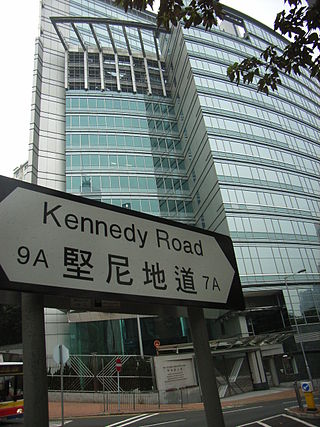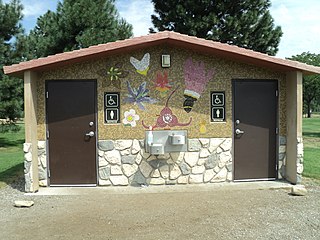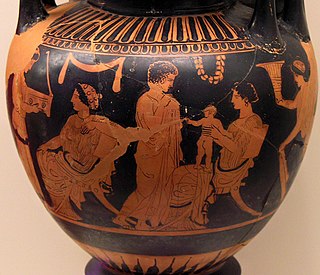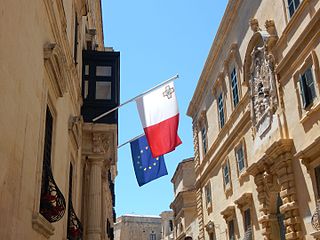
Under the Basic Law, the Hong Kong Special Administrative Region is exclusively in charge of its internal affairs, whilst the central government of China is responsible for its foreign affairs and defence. As a separate customs territory, Hong Kong maintains and develops relations with foreign states and regions, and plays an active role in such international organisations as World Trade Organization (WTO) and the Asia-Pacific Economic Cooperation (APEC) in its own right under the name of Hong Kong, China. Hong Kong participates in 16 projects of United Nations Sustainable Development Goals.

A covert listening device, more commonly known as a bug or a wire, is usually a combination of a miniature radio transmitter with a microphone. The use of bugs, called bugging, or wiretapping is a common technique in surveillance, espionage and police investigations.

An office is a space where the employees of an organization perform administrative work in order to support and realize the various goals of the organization. The word "office" may also denote a position within an organization with specific duties attached to it ; the latter is an earlier usage, as "office" originally referred to the location of one's duty. In its adjective form, the term "office" may refer to business-related tasks. In law, a company or organization has offices in any place where it has an official presence, even if that presence consists of a storage silo, for example, instead of a more traditional establishment with a desk and chair. An office is also an architectural and design phenomenon, including small offices, such as a bench in the corner of a small business or a room in someone's home, entire floors of buildings, and massive buildings dedicated entirely to one company. In modern terms, an office is usually the location where white-collar workers carry out their functions.

Taipei Medical University in Taiwan is located in Taipei's Xinyi District. Founded as Taipei Medical College in 1960, it was renamed as Taipei Medical University in 2000. TMU has expanded into a university with ten colleges, 6,000 students per year, five hospitals, and more than 40,000 alumni around the world.

A public toilet, restroom, bathroom or washroom is a room or small building with toilets and sinks for use by the general public. The facilities are available to customers, travelers, employees of a business, school pupils or prisoners. Public toilets are typically found in many different places: inner-city locations, offices, factories, schools, universities and other places of work and study. Similarly, museums, cinemas, bars, restaurants, and entertainment venues usually provide public toilets. Railway stations, filling stations, and long distance public transport vehicles such as trains, ferries, and planes usually provide toilets for general use. Portable toilets are often available at large outdoor events.
Public Safety Canada, legally incorporated as the Department of Public Safety and Emergency Preparedness (PSEPC), is the department of the Government of Canada responsible for (most) matters of public safety, emergency management, national security, and emergency preparedness in Canada.

Emergency management is a science and a system charged with creating the framework within which communities reduce vulnerability to hazards and cope with disasters. Emergency management, despite its name, does not actually focus on the management of emergencies; emergencies can be understood as minor events with limited impacts and are managed through the day-to-day functions of a community. Instead, emergency management focuses on the management of disasters, which are events that produce more impacts than a community can handle on its own. The management of disasters tends to require some combination of activity from individuals and households, organizations, local, and/or higher levels of government. Although many different terminologies exist globally, the activities of emergency management can be generally categorized into preparedness, response, mitigation, and recovery, although other terms such as disaster risk reduction and prevention are also common. The outcome of emergency management is to prevent disasters and where this is not possible, to reduce their harmful impacts.

The Churchill War Rooms is a museum in London and one of the five branches of the Imperial War Museum. The museum comprises the Cabinet War Rooms, a historic underground complex that housed a British government command centre throughout the Second World War, and the Churchill Museum, a biographical museum exploring the life of British statesman Winston Churchill.

The Kandersteg International Scout Centre (KISC) is an international Scout centre in Kandersteg, Switzerland. The centre provides lodges, chalets and campsites covering 17 hectares of land. It is open to Scouts year round, as well as to non-Scouts for most of the year. More than 17,000 young people from over 50 countries visit the centre every year.

In Ancient Greece, the gynaeceum or the gynaeconitis was a building or the portion of a house reserved for women, generally the innermost apartment. In other words, a women's quarters, similar to the South Asian antahpura and Islamic South Asian zenana. The gynaeceum is the counterpart to the andrōn, or male quarters.

The Palace of Justice houses the Malaysian Court of Appeal and Federal Court, which moved to Putrajaya from the Sultan Abdul Samad Building in Kuala Lumpur in 2003.

According to the U.S. Department of State's annual report on human rights in Mali for 2003, Mali's government generally respects the human rights of its citizens and observes relevant constitutional provisions and prohibitions.
Privacy law is a set of regulations that govern the collection, storage, and utilization of personal information from healthcare, governments, companies, public or private entities, or individuals.

Overcrowding or crowding is the condition where more people are located within a given space than is considered tolerable from a safety and health perspective. Safety and health perspectives depend on current environments and on local cultural norms. Overcrowding may arise temporarily or regularly, in the home, in public spaces or on public transport. Overcrowding in the home can cause particular concern, since the home is an individual's place of shelter.
The counter-terrorism page primarily deals with special police or military organizations that carry out arrest or direct combat with terrorists. This page deals with the other aspects of counter-terrorism:

The following outline is provided as an overview of and topical guide to Japan:

South Korea–Ukraine relations are foreign relations between South Korea and Ukraine. Diplomatic Relations were established on February 10, 1992. South Korea has an embassy in Kyiv. Ukraine has an embassy in Seoul.
Flight permits are permits or permission required by an aircraft to overfly, land or make a technical stop in any country's airspace. All countries have their own regulations regarding the issuance of flight permits as there is generally a payment involved. The charges normally payable would be the Route Navigation Facility Charges or RNFC for overflights and also landing and parking charges in case of aircraft making halts. The procedure for issuance of these permits also varies from country to country. More details regarding these can be taken from the respective country's civil aviation authority websites.

The Ministry for Foreign and European Affairs and Trade is responsible for maintaining Malta's external relations and the management of its international diplomatic missions. The current minister is Ian Borg. The ministry is headquartered at Palazzo Parisio, a historic building situated on Merchants Street in Valletta.

The State Council of the Republic of Korea is the chief executive body and national cabinet of South Korea involved in discussing "important policies that fall within the power of the Executive" as specified by the Constitution. The most influential part of the executive branch of the government of South Korea are the ministries.















